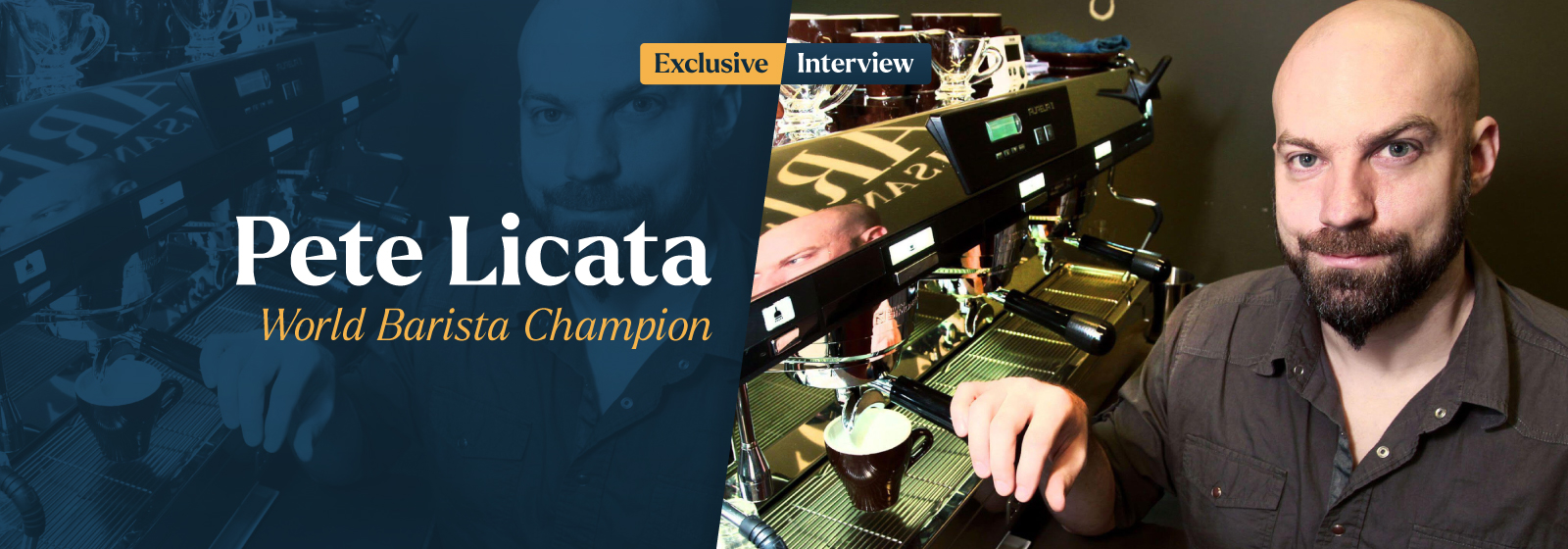Pete Licata: “Having a family has changed the risks I’m willing to take”
Benedict Smith chats with 2013 World Barista Champion and coffee consultant, Pete Licata, about Australian coffee culture, the future of automation, and the importance of finally settling down.
When Pete Licata won the World Barista Championship in 2013, he had no real idea of what would come next.
Having finally achieved one of coffee’s most prestigious awards, a goal that he had been almost single-mindedly working towards for nine years and had come so close to achieving in 2011 (when he finished second), he says the road ahead was unclear.
“It was one of those things where you’ve been trying to get to that point for so long, you don’t really know what to do,” he explains.
“You’re like, ‘I did the thing, so now what happens?’ It was monumental to me. There was a release: a feeling that I had unlocked an achievement for myself. But I didn’t have a clear idea of what was to come. It really was a ‘what next?’ situation.”
Pete is speaking to me from his home in Melbourne, Australia – the city where he was crowned as the world’s best barista.
It’s a long way from home. Originally from Kansas City in the US, he moved the distance of more than 9,000 miles to pursue a job with Nomad Coffee Group a year before the pandemic hit.
At Nomad, he works full-time as an R&D consultant, which is a change from the freelance consulting work that occupied the six years following his WBC success. During that period, he provided business advice for coffee shops and trained baristas for competitions, including Hidenori Izaki who won the WBC the year after Pete.
However, as well as enjoying his work with Nomad, he says it’s given him the stability demanded of him as a father.
“Having a family changed a lot for me. It changed the risks I’m willing to take. The stability for kids is really important. If I was travelling like I used to, I wouldn’t see my daughter for half the year.
“It’s more important to me to see my daughter than to travel the world. It’s a big part of my motivation and it gives my family the most that I can give them. It means my daughter realises she has a dad.”

Next year, it will have been almost a decade since Pete became World Barista Champion. And, in the coffee industry a lot has changed.
One of the most notable things is the reach of specialty coffee. When Pete was competing, it still occupied a small corner of the market. Now, it has begun to enter the mainstream and, in countries like Australia, high-quality coffee made by baristas has become an expectation.
“Here, you can go into a restaurant and get a good-quality shot of espresso after a meal,” he says. “Even McDonald’s has barista-made coffee. That’s a selling point. Getting access to green coffee, roasting knowledge, and preparation methods is not that difficult anymore.”
However, while this is clearly a global trend, Pete tells me he’s noticed a gulf between coffee cultures in Australia and the US.
“At the top level, you can get amazing coffees in equal measure. Where it starts to differ is in the average expectation. In the States, people say, ‘It’s really bitter, but that’s just coffee. Whereas in Australia, they say, ‘Why is it so bitter? That’s not how it should be’.”
For many, the key to creating a more level playing field is automation in the form of semi or even fully automatic coffee machines, in which every step of the process – from grinding to brewing – is controlled by a machine.
It’s something Pete has spoken briefly about in the past and I’m intrigued to know how a former world barista champion feels about a machine that could have done his job for him.
“It’s really tough,” he says. “Automation and the technology around it have grown to a point where you can get 80-85% of what you would get from a really good barista. Each time, you get a pretty consistent and very good – but not quite exceptional – coffee. And I believe that it will continue to grow. It’s the nature of technology and the way the world works.
“I think that you will have this division where people say they will go the classic way and do it as well as possible and put a tonne of money into training; and then you will have the people who will say this is the standard and it will get me the masses. That’s where I see coffee automation heading.”
This is just a brief glimpse into Pete’s deep-rooted insight and wide-ranging perspective of an industry he has not only been part of, but helped shape over the last 17 years.
As someone who has consulted for numerous brands and trained countless baristas, his ability to put emotions aside and provide logical advice has helped make him one of the most sought-after coffee consultants in the industry.
As for what the future holds? “Well,” Pete says, “that’s a bit unclear.”








